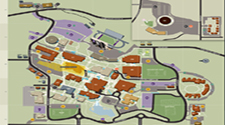Dr. Lisa Wiltbank
.jpeg)
Education
Ph.D. at Indiana University
B.S. at Brigham Young University
Contact Information
Email: lisawiltbank@weber.edu
Phone: 801-626-6995
Office Location:
Tracy Hall Science Center (TY)
Room 450H
Teaching Philosophy & Focus
I have a passion for discovery, which is driven by an intense desire to explore interesting questions that challenge my view of the world. I want to transfer this enthusiasm to students, but of course, this is not automatic. It can only happen if students find their own connection to the material. I am constantly working to develop classes and research projects that challenge and inspire students while implementing two of the most important ingredients of learning a teacher can provide: structure and guidance.
Courses Taught
Search Catalog For Course Details
Research Areas of Interest
My research focuses on photosynthetic bacteria and microbiology education. Any students interested in doing research, please feel free to contact me.
Specific Projects
Bacteria "see" in color
The ability to sense and respond to environmental light conditions is important to organisms across all kingdoms of life. Mechanisms for light perception and signal transduction vary widely, but common elements are conserved across domains, from seemingly-simple bacterial light-sensing systems to the complex eyes of animals.
The building blocks of photosensory systems are chromophore-binding photoreceptors: sensors that transduce light signals to control cellular processes. Whereas humans have three main types of color-distinguishing cone opsin photoreceptors, some species of photosynthetic cyanobacteria have over thirty independent photoreceptors! The functions of these photoreceptors and how this remarkable light-sensing ability benefits photosynthetic organisms remain important questions in the field of environmental microbiology.
There is currently a worldwide interest in developing cyanobacteria for solar-based bioenergy production. Efficient utilization of light is a major obstacle to the use of photosynthetic organisms for mass production of biofuels and our understanding of how cyanobacteria sense and respond to light is very limited.
What's a germ?
Microbes have a bad reputation. Some of that is earned, as bacteria, viruses, and other microorganisms cause deadly pandemics, destroy food sources, kill plants, disrupt ecosystems, and a myriad of other unspeakable horrors. However, microbes also prevent disease, create delicious food, act as symbionts with plants and animals, are necessary for life-sustaining nutrient cycles, and a host of other necessary and wonderful benefits to the Earth--and beyond.
We want to understand how people view microbes. To do this, we surveyed students at all different academic levels--from those who had never taken a college biology class to those in the last semester of microbiology degree. What do they know about bacteria and viruses? Do they view them negatively, positively, or a mix? This is especially interesting in light of the recent COVID-19 pandemic. Did this global event change students' views about bacteria and viruses?
Advisor & Office Hrs
New Major Advisor
Dr. Matthew Domek
Dr. Michele Culumber
Monday - Friday
8:00 a.m. - 4:30 p.m.
Mailing Address
Weber State University
College of Science
1415 Edvalson St., Dept. 2506
Ogden, UT 84408-2506
%20(1).jpg)
.jpg)
.jpeg)
